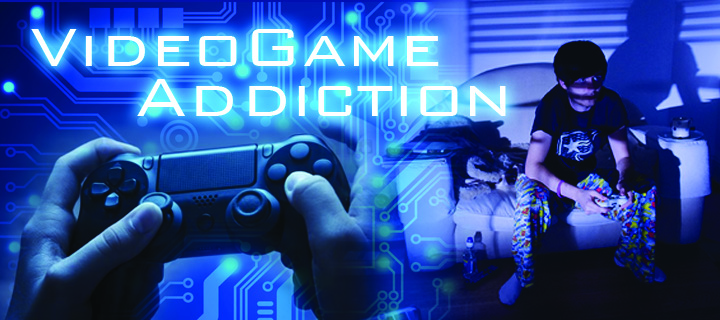Video Game Addiction
Video game addiction, also called gaming disorder, a type of technology dependence, is defined by the World Health Organization (WHO) in the draft 11th Revision of the International Classification of Diseases (ICD-11) as a pattern of gaming behavior (“digital-gaming” or “video-gaming”) characterized by impaired control over gaming, increasing priority given to gaming over other activities to the extent that gaming takes precedence over other interests and daily activities, and continuation or escalation of gaming despite the occurrence of negative consequences. The WHO is an agency of the United Nations.
When Is Gaming A Problem?
For video gaming to be considered a disorder, much like any other process disorder, the pattern of behavior associated with the activity must be of a sufficient level of severity as to cause considerable impairment or degradation of psychological, sociological, biological, family, educational, occupational or other significant area of functionality/life. While the WHO definition indicates that the condition would normally have been evident for 12 months in order to be diagnosed, we see from other types of addiction that time is a less a qualifier than the deleterious effects that such a disorder has on a person and their life. There are numerous documented cases over the past decade of gamers neglecting their kids, families, and careers, and occasionally even dying due to excessive video-game playing.
While gaming disorder is included in the ICD-11, it is not yet included in the Diagnostic and Statistical Manual 5 (DSM-5) used in the United States for the diagnosis of mental health disorders. It is strongly suspected, however, that due to its prevalence, it will be listed in the next revision of the DSM, though no time is given for the next version.
In the United Kingdom of Great Britain, the National Health Service is launching its first video game addiction center. The Centre for Internet Disorders will ‘initially focus on gaming disorders’ and will likely include more expansive treatment for other forms of technology dependence, such as addiction to, and the correlation of anxiety and depression with social media, especially among adolescents.
Clinic founder and psychiatrist Henrietta Bowden-Jones said “Gaming disorder is finally getting the attention it deserves. The distress and harm it can cause is extreme and I feel a moral duty on behalf of the NHS to provide the evidence-based treatment these young people and their families need.”
When Is Therapy Warranted?
When symptoms of excessive gaming start to arise, the initiation of therapeutic intervention is advised to keep a disorder from forming. When teens and young adults begin to neglect themselves and their lives, frequently by failing to keep up with hygiene, a drop in their grades and/or attendance at school, they or a loved one should reach out for help. ‘Failure to launch’ is a common term within the treatment industry to indicate a young adult who has graduated from high school, but fails to find the motivation or capability to go to college or to find a job, often times remaining at the parents’ home playing an excessive amount of video games in order to avoid the sometimes overwhelming responsibility of figuring out their lives. Process disorders such as video game addiction are often-times fueled by an underlying and sometimes undiagnosed condition such as an anxiety disorder or depression. It is imperative to have a psychological assessment done to determine the cause of the addictive behavior and to help alleviate the underlying cause.
How Ascend Healthcare Treats Video Game Addiction
Some of our initial steps for treating teens mired in video game addiction are:
- We identify issues in the adolescent’s life causing discomfort and pain.
- We explore what are teens avoiding by participating in gaming and avoiding school and/or real life responsibilities.
- We explore any underlying and fueling anxiety or depression.
- We examine what is soothing about the process of gaming.
- We take gaming away and look at what is left.
- We observe social interactions in the absence of gaming.
- We teach and encourage social skills development.
- We use mindfulness to help teenagers tune into their body/mind and what is going on inside. We help them deal with what is happening as opposed to avoiding it with constant distraction.
- We work on family issues and how to create safe boundaries with any device used within a home.
- We set reasonable time limits and grant access when it is earned.
- We teach these healthy boundaries to the entire family and ingrain them into the family structure.







